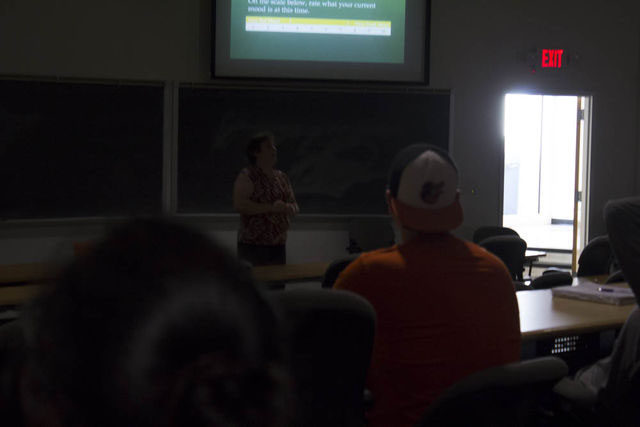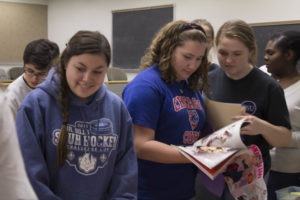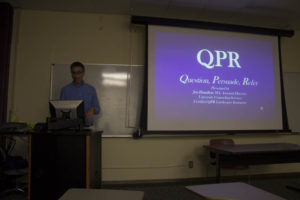
Nov. 4-5
Student Government and MOPIP sponsor event to teach first aid
Mental Health Awareness week drew to a close Saturday, Nov. 5 with an event about mental health first aid.
Mental Health Awareness Week was a capstone project by two health science majors, seniors Sophie Hauri and Bailie O’Connell.
There was a similar event last year, from which they drew a lot of inspiration. They brought back yoga and first-aid training, but added new things as well, such as QPR, or Question, Persuade and Refer, training and an event hosted in partnership with the Women’s Resource Center.
Hauri says they were interested in doing their capstone on mental health awareness because they both knew people who had been affected by mental health issues.
She also says the suicides at the beginning of the semester were extra motivation to make sure Mental Health Awareness Week an informational and useful event.
Hauri says the theme for the week of events was Shake the Stigma. She says mental health has a stigma surrounding it and she and O’Connell hoped to shake some of those stigmas with their Mental Health Awareness Week.
“A lot of mental health issues are very misunderstood,” Hauri says. “There [are] a lot of stereotypes and misinformation surrounding mental health and mental illness.”
O’Connell says she hopes people know the resources available for mental health issues, from the people they contacted to help them with their events this week and the people who contacted them who wanted to put on events,
“Our biggest thing is to shake the stigma and giving Truman students resources on and off-campus,” O’Connell says. “We want to promote positive mental health in any way that we can.”
Nov. 3
WRC holds event to discuss women’s mental health
Thursday night’s Mental Health Awareness week event was put on by the Women’s Resource Center and was a combination of a talk about the history and statistics of mental health for women and activities to lower stress.
Hope Lasota was the speaker from the WRC at Truman State University. During her presentation she discussed the relationship women have with mental health.
She first delved into the history of women and mental health, explaining the Victorian origins of the words hysteria.

She then reflected on both the biological and social factors that contribute to the mental health of women, such as reproductive hormones, genetics and media pressures to be perfect.
Lastly, she talked about the duck effect, a term coined at Duke University. The duck effect suggests that many college students have the outward appearance of a duck floating peacefully on the water, but under the surface there’s a lot of work going into the gliding.
“That’s something a lot of students face — the battle of making it look effortless while actually struggling on the inside,” Lasota says.
After the presentation on women and mental health, the people in attendance at the event were encouraged to stick around and do an activity to relieve stress.
Available were coloring pages, recipes for easily made food, chair yoga and supplies for an inspiration board, featuring a mirror in the middle so the attendees could be their own inspiration.
Sydney Gosick, who led the activities after the presentation, said stress relief is a huge part of mental health.
“During college, you’re overwhelmed by a lot. If you develop bad coping mechanisms it could worsen mental health,” Gosick says. “We want you to develop coping mechanisms so you can take control of your own mental wellness.”
Nov. 2
UCS holds suicide prevention training

The next event in the line-up for Mental Health Awareness Week was QPR Training Wednesday night.
Joe Hamilton, Assistant Director of University Counseling Services, gave a lecture on a suicide prevention training called QPR, an acronym for Question, Persuade, Refer.
At the training, Hamilton covered topics such as myths and facts about suicide, the warning signs of suicide and suicide ideation and how to ask someone if they are feeling suicidal.
Hamilton began the training with a symbolic story of three bridges, the purpose of which was to show that suicidal action is often an impulse decision, and any barrier will often prevent the action of suicide being taken.
Hamilton then described some of the warning signs of suicide. These could be direct or indirect verbal clues, behavior clues or situational clues.
He then went on to explain the QPR procedure. The first of these is to questions, or ask someone if they are thinking of ending their life. The next step is persuade. Persuading means to listen to the person talk, then try to persuade them to seek help. This leads to referring, or getting that person in contact with professionals who can help them.
Hamilton stressed that if you suspect someone might be considering suicide, you should ask that person.
“Any time you have any sort of indication that someone might be at risk of harm to themselves, then that’s when you want to intervene,” Hamilton says. “Don’t wait or second guess yourself. It doesn’t hurt to ask.”
Hamilton says he hopes his lecture enables more people to have a willingness to talk about suicide prevention and mental health in general.
At Truman State University, students can contact University Counseling Services at 660-785-4014 during normal business hours or 660-665-5621 after hours in cases of urgent concerns which need to be addressed. People can also call 1-800-273-8255 or the National Suicide Prevention Lifeline.
Nov. 1
Dr. Jennifer Hurst Presents on Nature and its effects on Mental Health
On Tuesday, Nov. 1, Jennifer Hurst, professor of health and exercise sciences, gave a lecture on the effects that nature can have on mental health.
As Mental Health Awareness week continues, other approaches to addressing mental health were discussed at Hurst’s lecture on Tuesday.
Hurst says when she heard the schools of health science and education were going to do a week opening the conversation about mental health, it was right in her niche, so she offered to do a lecture.
“In some ways, my approach to it or the things I talk about in relationship to it aren’t always the common things that are discussed on a college campus,” Hurst says.
The effects of nature on mental health has been the focus of Dr. Hurst’s research, and she will use her time on sabbatical starting in the spring semester to further research these effects.
She says she became interested in the topic when she began to notice how nature affected her own mental health. She said this particular topic is where her personal and professional interests intersected.
Hurst says it’s important that we make a point to discuss mental health because we don’t talk about it enough. She says there are many stigmas attached to mental health, and there is a lot of misinformation.
She says we need to be thinking of what we as a campus can do to eradicate some of these problems.
Hurst says she hopes her lecture will help people realize that it’s okay to talk about mental illness, to know that help is available, and to get people outside.
